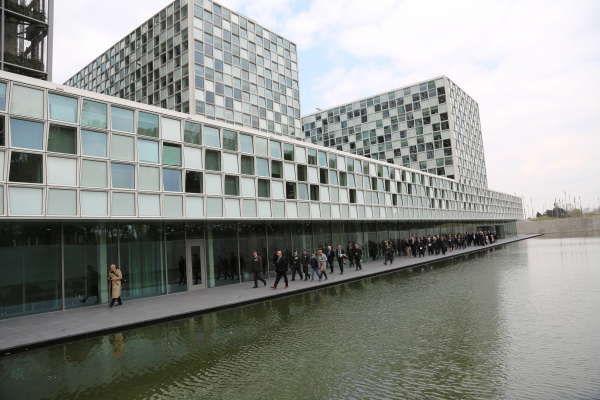British jurist Peter Lewis was on March 28 elected new Registrar of the International Criminal Court (ICC). Unlike his three predecessors, he is not an insider, but has solid experience as a Crown prosecutor in England and Wales. He succeeds Herman von Hebel of the Netherlands and will take up his post on April 16, with a mandate for five years.
For the next five years, Peter Lewis will be the key man in the Court’s administration. The 18 ICC judges – of whom six have just been inaugurated – have elected a former British prosecutor to head the Registry. They passed over the favourites: Marc Dubuisson of Belgium, current director of judicial support services in the Registry who has 20 years’ experience in international justice; and French-Senegalese former deputy Registrar Didier Preira, who has 14 years of international experience. This is the first time that an outsider has been chosen for the post. Peter Lewis does not know the inside secrets of international justice. His experience of the ICC is old but pertinent. In 1999, Peter Lewis participated, on behalf of the UK, in the Commission on the Rules of Procedure and Evidence, a kind of Penal Code of the ICC. He also took part in a working group on the rules governing the Office of the Prosecutor. The judges have nevertheless chosen continuity with regard to one point: as in the case of the first three Registrars, they have chosen a European.
Budget of 150 million to be managed
The new Registrar will have to manage an annual budget of some 150 million Euros and an institution with 900 permanent staff. In addition to budget and finances, the Registrar is responsible for all administrative oversight, maintenance of the Court’s new premises, security, communication and outreach (raising awareness), translating and interpreting services, courtroom management, witness protection, administration of lawyers, victims’ representation, the prison, the staff, relations with host country The Netherlands, etc. In addition to these administrative and judicial tasks is a more diplomatic role on States cooperation, notably for the arrest and transfer to The Hague of suspects and bringing witnesses to the Court. Peter Lewis must also convince the States Parties to conclude agreements notably to host protected witnesses on their soil or take ICC convicts in their prisons. He will also have to coordinate with Prosecutor Fatou Bensouda and his boss the ICC President, Canadian-Nigerian judge Chile Eboe-Osuji, who was also recently elected by his colleagues on March 9.
Promise of efficiency
Ever since its first steps in 2002, the Court has set up very bureaucratic procedures and the States Parties (member states) have since 2009 been demanding reforms. Outgoing Registrar Herman von Hebel, who will hand over the keys of the Registry to Peter Lewis on April 16, was elected in 2013 on a platform of ambitious reforms, but their implementation has been costly and the results marginal. On paper, Peter Lewis looks like a reformer, and stresses his previous experience. As head of the Crown prosecution services in the UK, he implemented from 2010 to 2015 budget cuts decided by the government of David Cameron, reducing the budget of the institution by some 120 million British pounds and introducing deep reforms. The number of civil servants was cut from 9,000 to 6,000, without losing efficiency, according to him. The former prosecutor says the Court’s major challenge is to ensure it continues to bring to justice the most serious cases at a cost that States Parties are ready to pay.
The candidates for Registrar must, several months before the election, campaign amongst the ICC States Parties – which formulate an opinion on the expected profile – and before the ICC judges, who are the ones to vote. In the course of the campaign, the candidates are also questioned by the NGO Coalition for the International Criminal Court (CICC) and the International Criminal Court Bar Association (ICCBA) on their future programme. Asked about the challenges, Peter Lewis said the priority was to optimize resources and the efficiency of the Court. Otherwise, he said, there is a real risk that funding by the States Parties will be cut, affecting future efficiency.
It seems that Peter Lewis has studied his future job seriously, identifying the complaints against the Court: bureaucracy, lack of efficiency, governance problems, loss of trust, lack of a common vision, criticisms of its legal assistance and even its website. Asked by the NGO Coalition about the place of victims, Peter Lewis said they represent “an essential element in the Court’s legitimacy”. He says the Registrar must convince States Parties to “make the participation of witnesses a central element in the unique mandate of the Court”.






